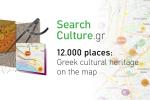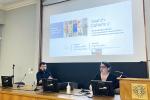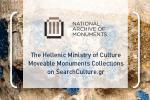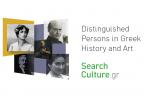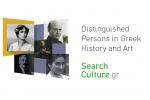
The National Documentation Center (EKT) celebrates a double milestone: the public portal of the Greek National Aggregator of Digital Cultural Content, SearchCulture.gr completes 10 years of life, innovation, and public service this year, while the digital cultural items it collects now exceed 1,000,000. More than 110 cultural organizations from across Greece participate in the SearchCulture.gr network, offering access to their digital collections.
What is SearchCulture.gr
SearchCulture.gr is the Greek national portal for aggregating digital cultural heritage and contemporary artistic production. The infrastructure was built by EKT starting in 2013, a bespoke Java-based software platform, designed and implemented in-house by EKT’s scientific and IT teams from the ground up.
SearchCulture.gr offers a high-quality discovery environment for accessing the country's cultural treasures, through collaboration with more than 110 content providers, and serves as the accredited National Aggregator for the European cultural heritage platform, Europeana.
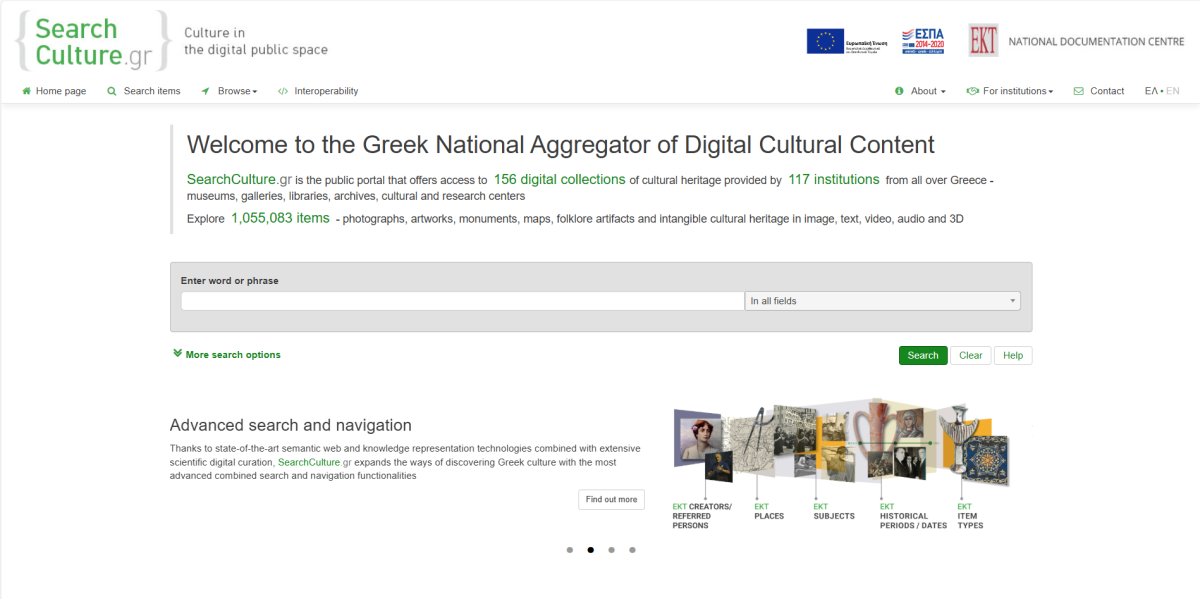
Towards a National Digital Collection
Today, the platform hosts over 150 digital collections from institutions across the country, which amount to 1.055.083 items. Photographs, artworks, costumes, music scores, artefacts, magazines, manuscripts, maps, videos, and 3D models are some of the types of items aggregated in SearchCulture.gr. The number of items increases continuously, strengthening the visibility of Greek culture online.
Participating organizations include the Ministry of Culture, the National Gallery, the Greek National Opera, the National Theatre of Greece, the Thessaloniki International Film Festival, the Hellenic Literary and Cultural Archive of the National Bank of Greece Cultural Foundation, the Academy of Athens, the National Research Foundation “Eleftherios K. Venizelos”, and many more are participating in the dynamic cultural network that contributes content to the aggregator.

A Model Infrastructure for cultural data
SearchCulture.gr is considered a unique infrastructure amongst our peers. Its foundation lies on the principles of Open Data and the power of semantic technologies, as well as state-of-the-art documentation and interoperability standards in the field of digital culture. All digital files are made available with a standardized, machine-readable license, as well as through APIs and data dumps, fully supporting reuse by the research and educational communities and the creative industries.
SearchCulture.gr combines semantic web and linked data technologies with thorough scientific curation to offer the most advanced search and discovery services for accessing the large and heterogeneous volume of data it hosts.
Smart Search and Interactive Browsing
The user is presented with seven curated access routes for targeted searches: creator, referenced person, type, subject, date of creation, historical period και location of reference or creation. These parameters can be combined either as search criteria or as filters for sorting results, offering precise and dynamic content discovery.

A dedicated search engine for historical entities is a highlight as it offers filters such as profession or occupation, gender, as well as birth or death date and location. Users can search, filter and navigate to the items that the specific person created or items with which they are associated.
The discovery experience is enriched with interactive applications, such as the display of results on a map, facilitating hands-on exploration and visual navigation of items and persons.
The result is that users can explore cultural heritage objects that:
- span 9 millennia of history,
- are related to more than 12,000 geographical locations,
- refer to 10,000 historical figures,
- and are classified into 2,000 thematic categories.
A Linked Knowledge Ecosystem
SearchCulture.gr, thanks to comprehensive semantic enrichments carried out by its scientific team, transforms a heterogeneous bulk of metadata into a Linked Open Data ecosystem of knowledge. Precision, multilingualism, and semantic interconnection ensure that the collections acquire a narrative dimension and unexpected relationships are revealed between places, people, topics, and historical periods.
Data-driven narratives are the foundation for SearchCulture.gr's virtual exhibitions: 100 Thematic Exhibitions and 26 Portraits (people based exhibitions) tell the stories that emerge through the combined use of the advanced search filters. These exhibitions are not simply curated data sets, but the result of semantic enrichments, offering users a unique experience of cultural discovery through exploratory learning.
With approximately 1,500 unique visitors per day, SearchCulture.gr makes Greece's cultural heritage an open public treasure, available for education, research, the creative industries, and citizens.
Transparency, Accountability and Civic Value
The emergence of a public digital cultural space is supported by national and regional programs that fund cultural content digitization projects. The integration of the results from the Operational Programme Competitiveness, Entrepreneurship and Innovation 2014-2020 (EPAnEK) (Call 118:"Creation, Promotion, and Valorisation of Digital Cultural Heritage") into SearchCulture.gr will be soon completed.
The program, with 43 Actions and a budget of over 25 million euros, made possible the digitization and creation of new repositories, the upgrade of existing infrastructures, and the addition of over 250,000 digital items to SearchCulture.gr.
The new collections come from a wide range of organizations, such as the Museum of the City of Athens, the Michalis Kakogiannis Foundation, the Nikos Kazantzakis Museum, the State Theater of Northern Greece, the Kalavryta Holocaust Museum, the National Theater, the Vasilis and Marina Theocharakis Foundation, as well as the Holy Metropolises of Ioannina and Syros among many other cultural organizations across the country.
SearchCulture.gr is gradually also incorporating results from Calls 05 and 05B of the Digital Transformation Program 2021-2027 of the Ministry of Digital Governance, as well as Actions implemented through the Antonis Tritsis Program of the Ministry of the Interior.
The Institutions undertaking such projects have to conform to Interoperability Specifications and Guidelines and EKT undertakes the tasks of quality control, comprehensive semantic curation, integration of collections into SearchCulture.gr and Europeana, as well as their promotion through exhibitions, webinars, and other communication campaigns.
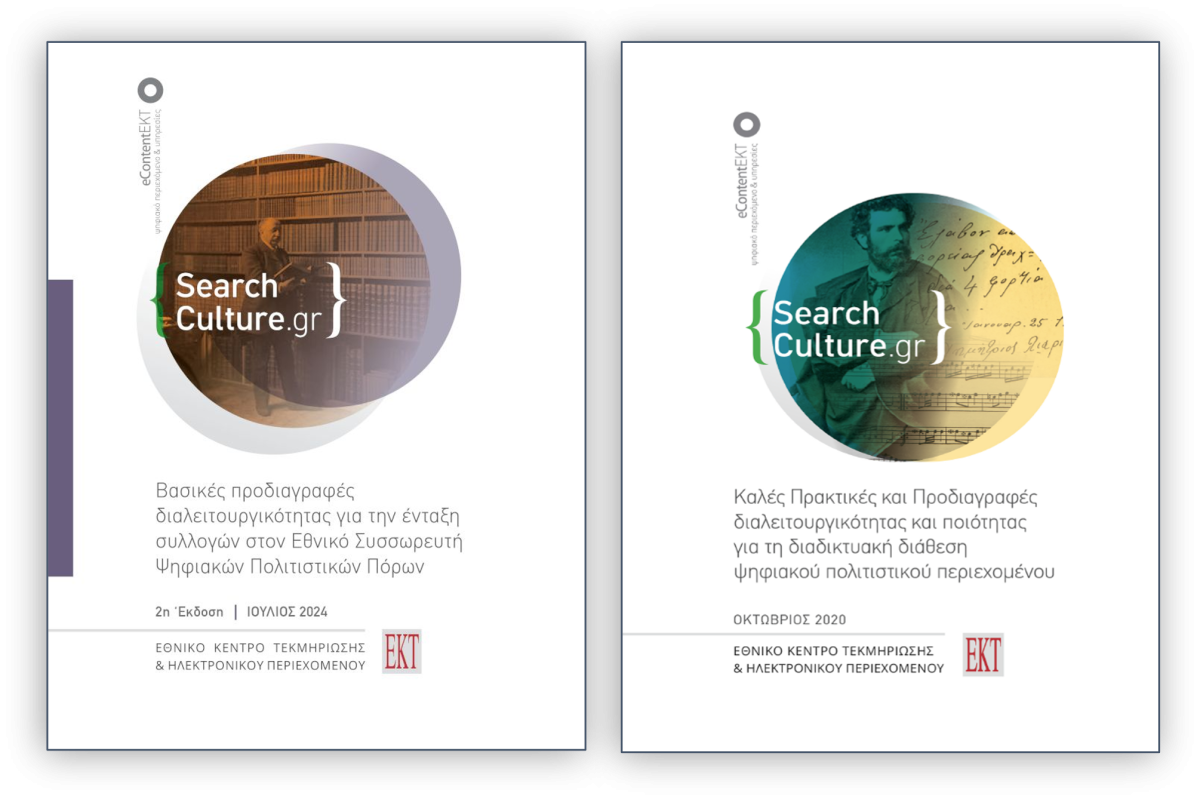
The adoption of nationwide quality standards ensures that digital content produced with public money remains open, high-quality, and interoperable, supporting long-term sustainability of public investments.
During this decade, a public digital cultural space emerged, promising free and open access to our shared cultural heritage, supporting research, education, and creative reuse, and delivering measurable value to citizens by ensuring transparency and accountability.
The Future: Towards a Greek Data Space for Culture
The upcoming trajectory of SearchCulture.gr signals a transition: from a search portal, it will evolve into a Data Space, acquiring a new dimension focused on readiness for the transformative technologies of the 21st century, such as Artificial Intelligence.
EKT is participating in «Pharos – The Greek AI Factory for accelerating AI innovation», specifically in the domains of Greek Language and Culture. As the partner responsible for the Greek Data Space for Culture, EKT undertakes a significant role: to improve the representation and re-use of Greek cultural heritage in computational environments, contributing to the development of innovative methodologies for discovering, accessing, and reusing cultural resources.Europeana is also on a parallel transformative trajectory for the European Data Space for Culture, which, along with the other, Data Spaces, implements the EU's plan for a thriving, data-driven society.
Within the project, SearchCulture.gr will increase its aggregated content from cultural institutions and will leverage Artificial Intelligence to maximize the country's digital cultural heritage's accessibility and discoverability. Museums, archives, and libraries’ collections in SearchCulture.gr will be organized and made available as enriched datasets, further expanding their value in an AI driven society.
Through semantic enrichments and data interoperability practices, EKT’s scope is that cultural data will be high-quality, ethically sourced, and technically optimized - which is not only a practical necessity but also a social responsibility.
With this strategy, SearchCulture.gr will not simply be a portal for cultural collections, but it will become a dynamic data ecosystem, where culture, technology and society will interact to generate new knowledge, public value, and new creativity.
Development History
- The initial development of SearchCulture.gr started with the project “A Services’ Platform for the Safe Deposit, Management and Dissemination of Open Data and Digital Content” that is being funded through the Operational Programme "Digital Convergence", NSFR (2007-2013) co-financed by Greece and the European Union - European Regional Development Fund.
- Later, from 2019 to 2020, the Europeana Common Culture project, which focused on strengthening the role of national cultural content aggregators in the Europeana network, helped SearchCulture.gr augment and improve its content.
- From 2020 to 2023, SearchCulture.gr was upgraded through the project «National Research Information and Technology System: Digital Content Aggregation, Documentation and Dissemination Infrastructure ensuring interoperability, long-term preservation and open access» (Operational Programme "Public Sector Reform", NSRF).











